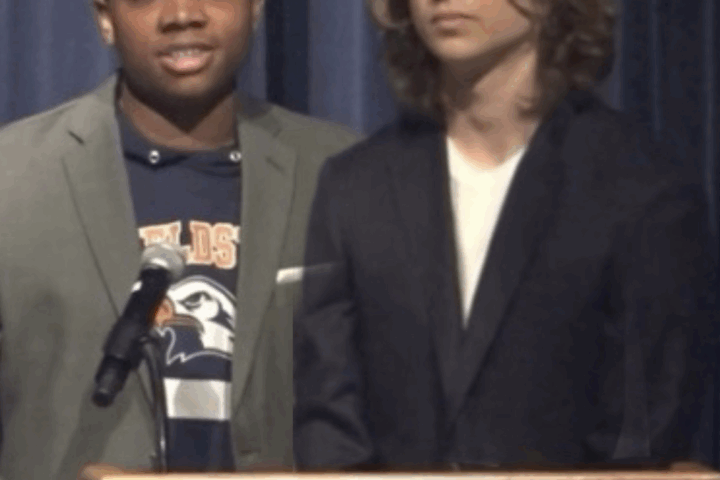If you are the person who will glance at this article and instantly become angry (how could he?), then please do not read this article. Stop here.
Gone? Good. Such attitudes of intolerance towards views that aren’t one’s own are part of the problem and indicative of the state of discourse at Fieldston today.
This article is against the proposed gender mandate which would enforce a male-female partnership for every candidacy duo in the FSG elections for different reasons. I want to stress that, before delving into this issue, there is indeed a grave problem at Fieldston (and at large) with misogyny and discrimination. I respect what the mandate is trying to do and the opinions of those who support it; they are certainly valid and rooted in devastating realities. That doesn’t deter my opinions.
“Do you think that it should be mandated that FSG presidents must not be the same sex?” That is the way the question of the gender mandate was posed, which seems to suggest no room for those who do not identify as either sex nor those who are transgender or genderqueer. While some may suggest that this is verbal nitpicking, I am not alone in my assessment.
“I would have the mandate not be a boy-girl ticket, but make it mandatory to have partners who simply do not identify as the same gender,” says Form V co-representative Julia Rosenberg, who is pro-mandate in some capacity. Dejon Bunn-Constant (VI) elaborates on this point.
“I have an issue with the mandate because it reinforces the gender binary, and erases the identity of genderqueer people at our school by discouraging them from running,” says Bunn-Constant. Even those who have not been at Fieldston very long can envision future complications.
“I can only think of students who do not identify as (either) female (or) male. Introducing this mandate would make it impossible (for them) to run as candidates,” states Bence “Csebe” Cserkuti (V), whose interest in and knowledge of this issue is remarkable for someone who has only been at this school for a few months.
The reason that I am presenting these sentiments, even in a compressed format, is to demonstrate that a mandate proposed to produce equity in a very Fieldstonian manner is not being stated in a very Fieldstonian manner. I find this rather odd. Clearly, I am not alone in that regard, even joined by people who are pro-mandate. Luckily, this is an issue that can be resolved quickly, and I’m confident that the exclusion was not the intention of those involved in crafting the proposal.
Now we can begin to discuss the matters that are deeper-set. I think that it is rather curious that the tone that this discussion has taken has always been that the young men will be forced to “carry the weight” or “take on” the young women on the ballot; isn’t it possible for the young women to be in the position of power within the duo? These two ways of suggesting who will be “carrying” whom is rather ridiculous to me, especially when the former suggestion is the dominant one that I’ve heard from both young men and young women. What I’m afraid of with the mandate is that this sort of “carrying” attitude, which I believe will persist particularly among young men without addressing their place in the gender conversation, won’t go away because of the events that precipitated the mandate itself. Would Marie Skłodowska-Curie, Malala Yousafzai, and Oprah Winfrey be role models for young women if the Sorbonne needed to have a female professor, if the Nobel Peace Prize winner had to be female every other year, and if ABC had to have a certain number of shows hosted by women? I would think not – in fact, I think the mandate creates a precedent for the commodification of one’s social identifiers.
Let’s play the commodification game for a second. Even by these confines, are you telling me that two young men or women who are non-white, non-Judeo-Christian, and non-hetereosexual are less worthwhile to be FSG co-presidents than a white-as-snow male-female duo who are as perfectly groomed as the hedges at their country club?
Another fact: I had to play the above card (in paragraph form) as part of this article. There’s no way around it; there is a certain love of using identities as objects. It even worked for me: Skłodowska-Curie, Yousafzai, and Winfrey. What we’re doing here is promoting a visible diversity, not celebrating the inner realities that make those visible diversities important. I can’t help but think that is is a more cinnamon-y, toastier, crunchier diversity – it’s the diversity you can see! – that erodes what we’re actually trying to accomplish. It’s a step in the right direction, but a leap in the wrong one.
So, if the goal of the mandate is to create balance in leadership, then what is the goal of balance in leadership? I would think the goal of balance in leadership should be to create results that come from a varying array of opinions and backgrounds, not to promote the dogma, however noble, of one ism; this is reckless ism-ing at its best intentioned and most harmful. Unfortunately, that’s the sort of ism-ing you find in high schools, especially ones that beknight themselves with progressivism.
If the goal of the mandate, as it stands, is to show young women that they can become leaders, without regard for the competence of those young women, then we have arrived at a fork in the road: do we promote gender diversity at the expense of Fieldston’s well-being or do we promote Fieldston’s well-being at the expense of gender diversity? Clearly, the mandate supports the former, at least in the long run. That is not to say that a young woman who runs isn’t competent (I imagine it would be quite the opposite in general), but that meddling with how the duos are formed will undoubtedly lead to more poor candidates and presidents.
It’s important to remember here that young women can run, they just haven’t. I don’t think that young women have any lesser chance to win a presidential election at Fieldston than young men, but there is the very real stigma and pressure that comes with being a young woman, particularly one that speaks her mind in a public setting. So what’s my solution?
Anyone eligible but afraid to run, regardless of background, it is up to you to make an effort. I know it’s hard. I know it’s scary. But it doesn’t matter if you don’t think you’re going to win (I – whose outer lack of diversity you can see can’t trump the inner diversity I know – didn’t think I was going to win): you have to make a stand. Even getting up onto that stage to speak is a victory. However, it’s only a victory, a true victory for you and for people like you, in whatever way that means – too non-white, too fat, too depressed, too woman, too anxious, too non-heterosexual, too non-cis, too ugly, too different – if you run on your own accord.
That’s the source of change.
Please understand that this is not an article to simply disparage and discredit the work of this community towards becoming more inclusive, diverse, and informed. To love my school is to criticize it; I want what is best for this school and I always will. Now, my idea of a better Fieldston may not be the same one as yours; it almost certainly isn’t. And it almost certainly isn’t the idea of the best Fieldston.
It’s just an opinion.





